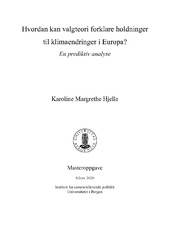| dc.contributor.author | Hjelle, Karoline Margrethe | |
| dc.date.accessioned | 2020-08-28T05:10:17Z | |
| dc.date.available | 2020-08-28T05:10:17Z | |
| dc.date.issued | 2020-08-28 | |
| dc.date.submitted | 2020-08-27T22:00:20Z | |
| dc.identifier.uri | https://hdl.handle.net/1956/23906 | |
| dc.description.abstract | This thesis identifies various explanations for attitudes towards climate change. My argument is that there are several explanations in the literature on perceptions of climate change that are not elucidated. These explanations are fragmented. The methods used in the existing literature may limit the number of possible explanatory factors. Moreover, the methods and the number of explanatory factors in the previous literature can cause the models to be underspecified. This may lead to important control variables being excluded from the analysis. In addition the methods are not well suited to capture non-linear relationships and interaction effects. In sum this makes it difficult to rely on the results from the previous literature. The thesis puts together theoretical threads from the existing literature, as well as adding obvious but neglected threads from the established voting literature. This creates a high number of potential (new and old) explanatory variables, which is the basis of machine learning as a method: a suitable empirical tool for feature selection. Putting this argument to test, the thesis uses machine learning with data from European Social Survey from 23 countries. The results from the analysis show that important explanatory variables from the traditional voting literature are crucial for predicting attitudes towards climate change. The group of important explanatory variables from the analysis can be divided into social controls, trust/satisfaction and values. The findings are not unambiguous but indicate that the classic explanatory factors that are established and widely tested in political science also apply to a new field of study. The voting literature is often important to investigate other issues and for the establishment of new theories in political science, such as post-material theories. Consequently the results is not surprising. | en_US |
| dc.language.iso | nob | |
| dc.publisher | The University of Bergen | |
| dc.rights | Copyright the Author. All rights reserved | |
| dc.subject | European Social Survey | |
| dc.subject | random Forest | |
| dc.subject | klimaendringer | |
| dc.subject | valgteori | |
| dc.subject | holdninger | |
| dc.subject | random Forest. | |
| dc.subject | maskinlæring | |
| dc.subject | offentlig opinion | |
| dc.title | Hvordan kan valgteori forklare holdninger til klimaendringer i Europa? En prediktiv analyse | |
| dc.title.alternative | How can voting theory explain attitudes towards climate change in Europe? A predictive analysis | |
| dc.type | Master thesis | en_US |
| dc.date.updated | 2020-08-27T22:00:20Z | |
| dc.rights.holder | Copyright the Author. All rights reserved | en_US |
| dc.description.degree | Masteroppgave | |
| dc.description.localcode | SAMPOL350 | |
| dc.description.localcode | MASV-SAPO | |
| dc.subject.nus | 731114 | |
| fs.subjectcode | SAMPOL350 | |
| fs.unitcode | 15-13-0 | |
